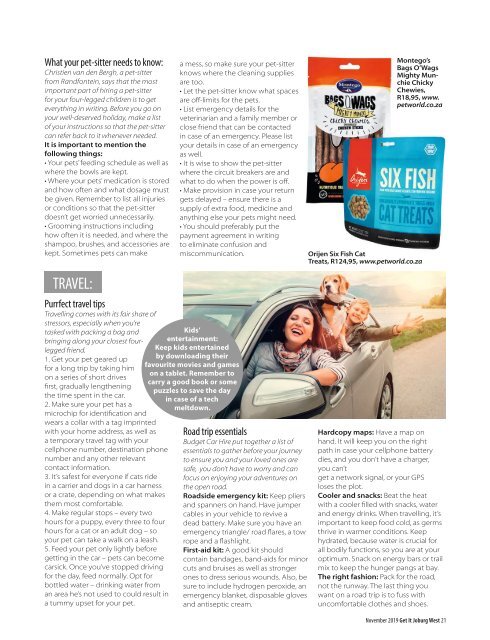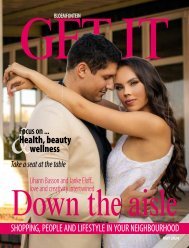Create successful ePaper yourself
Turn your PDF publications into a flip-book with our unique Google optimized e-Paper software.
What your pet-sitter needs to know:<br />
Christien van den Bergh, a pet-sitter<br />
from Randfontein, says that the most<br />
important part of hiring a pet-sitter<br />
for your four-legged children is to get<br />
everything in writing. Before you go on<br />
your well-deserved holiday, make a list<br />
of your instructions so that the pet-sitter<br />
can refer back to it whenever needed.<br />
It is important to mention the<br />
following things:<br />
• Your pets’ feeding schedule as well as<br />
where the bowls are kept.<br />
• Where your pets’ medication is stored<br />
and how often and what dosage must<br />
be given. Remember to list all injuries<br />
or conditions so that the pet-sitter<br />
doesn’t get worried unnecessarily.<br />
• Grooming instructions including<br />
how often it is needed, and where the<br />
shampoo, brushes, and accessories are<br />
kept. Sometimes pets can make<br />
TRAVEL:<br />
Purrfect travel tips<br />
Travelling comes with its fair share of<br />
stressors, especially when you’re<br />
tasked with packing a bag and<br />
bringing along your closest fourlegged<br />
friend.<br />
1. Get your pet geared up<br />
for a long trip by taking him<br />
on a series of short drives<br />
first, gradually lengthening<br />
the time spent in the car.<br />
2. Make sure your pet has a<br />
microchip for identification and<br />
wears a collar with a tag imprinted<br />
with your home address, as well as<br />
a temporary travel tag with your<br />
cellphone number, destination phone<br />
number and any other relevant<br />
contact information.<br />
3. It’s safest for everyone if cats ride<br />
in a carrier and dogs in a car harness<br />
or a crate, depending on what makes<br />
them most comfortable.<br />
4. Make regular stops – every two<br />
hours for a puppy, every three to four<br />
hours for a cat or an adult dog – so<br />
your pet can take a walk on a leash.<br />
5. Feed your pet only lightly before<br />
getting in the car – pets can become<br />
carsick. Once you’ve stopped driving<br />
for the day, feed normally. Opt for<br />
bottled water – drinking water from<br />
an area he’s not used to could result in<br />
a tummy upset for your pet.<br />
a mess, so make sure your pet-sitter<br />
knows where the cleaning supplies<br />
are too.<br />
• Let the pet-sitter know what spaces<br />
are off-limits for the pets.<br />
• List emergency details for the<br />
veterinarian and a family member or<br />
close friend that can be contacted<br />
in case of an emergency. Please list<br />
your details in case of an emergency<br />
as well.<br />
• It is wise to show the pet-sitter<br />
where the circuit breakers are and<br />
what to do when the power is off.<br />
• Make provision in case your return<br />
gets delayed – ensure there is a<br />
supply of extra food, medicine and<br />
anything else your pets might need.<br />
• You should preferably put the<br />
payment agreement in writing<br />
to eliminate confusion and<br />
miscommunication.<br />
Kids’<br />
entertainment:<br />
Keep kids entertained<br />
by downloading their<br />
favourite movies and games<br />
on a tablet. Remember to<br />
carry a good book or some<br />
puzzles to save the day<br />
in case of a tech<br />
meltdown.<br />
Road trip essentials<br />
Budget Car Hire put together a list of<br />
essentials to gather before your journey<br />
to ensure you and your loved ones are<br />
safe, you don’t have to worry and can<br />
focus on enjoying your adventures on<br />
the open road.<br />
Roadside emergency kit: Keep pliers<br />
and spanners on hand. Have jumper<br />
cables in your vehicle to revive a<br />
dead battery. Make sure you have an<br />
emergency triangle/ road flares, a tow<br />
rope and a flashlight.<br />
First-aid kit: A good kit should<br />
contain bandages, band-aids for minor<br />
cuts and bruises as well as stronger<br />
ones to dress serious wounds. Also, be<br />
sure to include hydrogen peroxide, an<br />
emergency blanket, disposable gloves<br />
and antiseptic cream.<br />
Montego’s<br />
Bags O’Wags<br />
Mighty Munchie<br />
Chicky<br />
Chewies,<br />
R18,95, www.<br />
petworld.co.za<br />
Orijen Six Fish Cat<br />
Treats, R124,95, www.petworld.co.za<br />
Hardcopy maps: Have a map on<br />
hand. It will keep you on the right<br />
path in case your cellphone battery<br />
dies, and you don’t have a charger,<br />
you can’t<br />
get a network signal, or your GPS<br />
loses the plot.<br />
Cooler and snacks: Beat the heat<br />
with a cooler filled with snacks, water<br />
and energy drinks. When travelling, it’s<br />
important to keep food cold, as germs<br />
thrive in warmer conditions. Keep<br />
hydrated, because water is crucial for<br />
all bodily functions, so you are at your<br />
optimum. Snack on energy bars or trail<br />
mix to keep the hunger pangs at bay.<br />
The right fashion: Pack for the road,<br />
not the runway. The last thing you<br />
want on a road trip is to fuss with<br />
uncomfortable clothes and shoes.<br />
<strong>Nov</strong>ember <strong>2019</strong> Get It Joburg <strong>West</strong> 21


















